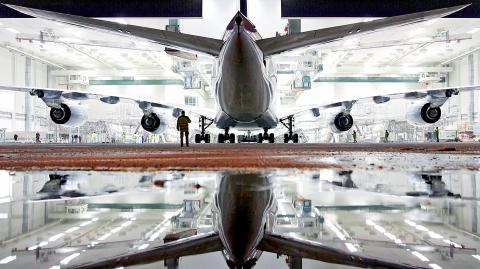Europe’s Airbus SE yesterday announced plans to scrap production of the Airbus A380, abandoning its dream of dominating the skies with a cruise liner for the 21st century after years of lackluster sales.
The world’s largest airliner, with two decks of spacious cabins and room for 544 people in standard layout, was designed to challenge Boeing’s legendary 747, but failed to take hold as airlines backed a new generation of smaller, more nimble jets.
The last A380 would be delivered in 2021, Airbus said in a statement.

Photo: Reuters
Confirming a shake-up first reported by Reuters, it said Emirates Airline — the largest A380 customer — had decided to reduce its orders for the iconic airplane and order a total of 70 of the smaller A350 and A330neo models.
The European company said it would enter talks with unions in coming weeks over the 3,000 to 3,500 jobs that would potentially be affected.
Airbus plans to produce 17 more of the planes, including 14 for Emirates and three for Japanese airline All Nippon Airways Co Ltd.
As part of the restructuring, Emirates placed a new order for 40 A330-900neo jets and 30 A350-900 aircraft, partially restoring a purchase of A350 aircraft which it canceled in 2014.
Emirates, which had built its global brand around the A380 and Boeing 777, and which also has 100 of the Airbus planes in its fleet, said it was disappointed by the closure.
“Emirates has been a staunch supporter of the A380 since its very inception,” Emirates chairman Sheikh Ahmed bin Saeed Al-Maktoum said.
“While we are disappointed to have to give up our order, and sad that the program could not be sustained, we accept that this is the reality of the situation,” he added.
The A380 is to remain a pillar of the Emirates fleet well into the 2030s, the airline said.
Emirates’ local rival Etihad Airways of Abu Dhabi also disclosed it was cutting some Airbus and Boeing jet orders, highlighting growing questions over the growth of Gulf airlines.
Making its maiden flight in 2005, the A380 was a major step in Airbus efforts to compete on equal terms with Boeing and challenge what had been a cash cow for its archrival.
However, sales of the industry’s largest four-engined airplanes have fallen due to improvements in lighter twin-engined alternatives, such as the Boeing 787 and 777, or Airbus’ own A350.
The prospect of a premature halt to A380 production emerged last month as part of a restructuring of orders first reported by Reuters.
The decision to scrap production is the last major step by outgoing Airbus chief executive officer Tom Enders.

Quanta Computer Inc (廣達) chairman Barry Lam (林百里) is expected to share his views about the artificial intelligence (AI) industry’s prospects during his speech at the company’s 37th anniversary ceremony, as AI servers have become a new growth engine for the equipment manufacturing service provider. Lam’s speech is much anticipated, as Quanta has risen as one of the world’s major AI server suppliers. The company reported a 30 percent year-on-year growth in consolidated revenue to NT$1.41 trillion (US$43.35 billion) last year, thanks to fast-growing demand for servers, especially those with AI capabilities. The company told investors in November last year that

Intel Corp has named Tasha Chuang (莊蓓瑜) to lead Intel Taiwan in a bid to reinforce relations between the company and its Taiwanese partners. The appointment of Chuang as general manager for Intel Taiwan takes effect on Thursday, the firm said in a statement yesterday. Chuang is to lead her team in Taiwan to pursue product development and sales growth in an effort to reinforce the company’s ties with its partners and clients, Intel said. Chuang was previously in charge of managing Intel’s ties with leading Taiwanese PC brand Asustek Computer Inc (華碩), which included helping Asustek strengthen its global businesses, the company

Taiwanese suppliers to Taiwan Semiconductor Manufacturing Co. (TSMC, 台積電) are expected to follow the contract chipmaker’s step to invest in the US, but their relocation may be seven to eight years away, Minister of Economic Affairs J.W. Kuo (郭智輝) said yesterday. When asked by opposition Chinese Nationalist Party (KMT) Legislator Niu Hsu-ting (牛煦庭) in the legislature about growing concerns that TSMC’s huge investments in the US will prompt its suppliers to follow suit, Kuo said based on the chipmaker’s current limited production volume, it is unlikely to lead its supply chain to go there for now. “Unless TSMC completes its planned six

TikTok abounds with viral videos accusing prestigious brands of secretly manufacturing luxury goods in China so they can be sold at cut prices. However, while these “revelations” are spurious, behind them lurks a well-oiled machine for selling counterfeit goods that is making the most of the confusion surrounding trade tariffs. Chinese content creators who portray themselves as workers or subcontractors in the luxury goods business claim that Beijing has lifted confidentiality clauses on local subcontractors as a way to respond to the huge hike in customs duties imposed on China by US President Donald Trump. They say this Chinese decision, of which Agence